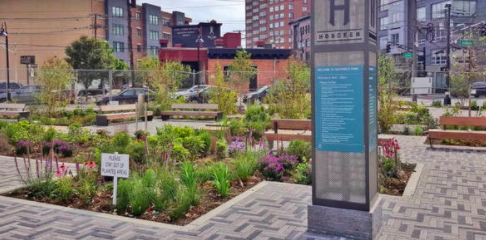Tapinto:
When large swathes of your cities were developed on land at or below sea level that had previously served as tidal wetlands for the Hudson River, flood mitigation is an ongoing concern. That’s why local administrations are continuing to seek new ways to combat the impacts of demonstrable shifts in rain patterns and intensifying storms.
Mayor Ravi Bhalla has announced that the City of Hoboken will be joining the Resilient Northeastern New Jersey—a coalition of stakeholders including the New Jersey Department of Environmental Protection (NJDEP), Jersey City, Newark, Bayonne, Hudson County, Ironbound Community Corporation, HOPES Community Assistance Partnership and project consultant Arcadis, which will seek to improve long-term regional environmental and economic resilience.
“As a coastal community, Hoboken knows first-hand the impacts of storm surge and heavy flooding events,” said Bhalla. “While we continue to make major strides in creating a more resilient city through our Rebuild by Design Project and comprehensive flood mitigation strategies, we are always striving to do more. The partnership we are entering into with key stakeholders and cities through Resilient Northeastern New Jersey will allow Hoboken to take a regional approach to adopt other best practices, and also share our successes with other communities as well. I encourage residents to provide their input through the Resilient NJ website.”
Jersey City faces many of the same concerns, with much of the city sharing space at the base of the Hudson River Palisade.
“Since passing a resolution to fight climate change at the start of my tenure, we’ve been aggressive and progressive in implementing actions including building a robust bicycle and pedestrian infrastructure, transitioning to a fully electric municipal fleet, and switching to renewable energy sources to run municipal operations – all as part of our commitment to reduce greenhouse gas emissions 80% by 2050,” said Jersey City Mayor Steven Fulop. “Jersey City’s first-ever Climate and Energy Action Plan will be adopted this Spring, and we’ll also be implementing our Energy Infrastructure Project to save taxpayers $21M in energy and operational costs by increasing our energy efficiency and resiliency. The critical actions we are taking today as leaders in our individual communities will pay off exponentially in our collective efforts in the worldwide Race to Zero.”
The project team is seeking input, information, and recommendations from residents, workers, businesses, and organizations regarding their own experiences with flooding and storm events. Specifically, the Resilient Northeastern New Jersey initiative will work to address flooding from coastal storms, high tides, heavy precipitation, and overflowing riverbanks. Read more>>
